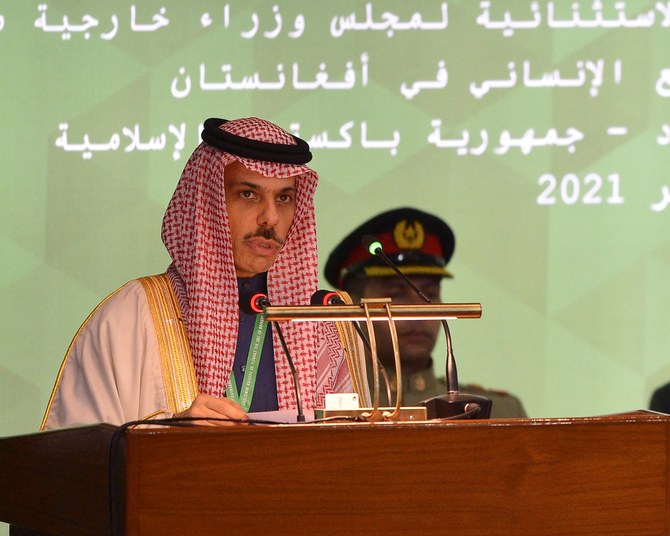ISLAMABAD: The Foreign Minister of Saudi Arabia, Prince Faisal Bin Farhan Al Saud, called on Pakistani Prime Minister Imran Khan on Sunday and told him he hoped an ongoing summit of the Organization of Islamic Cooperation (OIC) in Islamabad would help "mobilize" the international community to come to the aid of Afghanistan, which is facing an acute humanitarian crisis.
Pakistan is hosting the 17th Extraordinary Session of the OIC’s Council of Foreign Ministers, called by Saudi Arabia, at the Parliament House in Islamabad. The purpose of the summit is to rally Muslim and other countries to seek solutions for a growing economic and humanitarian crisis in Afghanistan.
“Thanking the Prime Minister for hosting the Extraordinary Session of the OIC Council of Foreign Ministers on the humanitarian situation in Afghanistan, Prince Faisal expressed hope that the Session would be instrumental in mobilizing the international community to support the people of Afghanistan on humanitarian grounds,” the Pakistani foreign office said in a statement.
“He also underscored the importance that Saudi Arabia attaches to its strong relationship with Pakistan, based on bonds of brotherhood.”
The Pakistani PM appreciated the Saudi initiative to convene the special OIC summit and expressed the hope that the world would not repeat the mistake of disengaging with Afghanistan.
“He urged the international community to support the vulnerable people of Afghanistan,” the statement said. “The Prime Minister highlighted that Pakistan has already committed to immediate relief of in-kind humanitarian assistance worth Rs. 5 billion, which comprises of food commodities including 50,000 MT of wheat, emergency medical supplies, winter shelters and other supplies.”
The Saudi foreign minister also met Pakistani chief of army staff (COAS) General Qamar Javed Bajwa.
“COAS said that this extraordinary session of OIC is extremely important to channelise international efforts & save Afghanistan from looming security & humanitarian crises,” a statement from the Pakistan army said.
The visiting dignitary appreciated Pakistan’s role in the “Afghan situation, special efforts for border management, role in regional stability and pledged to play his part for further improvement in diplomatic cooperation with Pakistan at all levels.”
Senior Taliban officials appealed this week for international help to combat a deepening economic crisis that has fueled fears of another refugee exodus from Afghanistan.
The comments, at a special meeting to mark the UN's international migrants day, underlined the new Taliban government's push to engage with the world community, four months after they seized power in Kabul.
The movement's deputy foreign minister, Sher Mohammad Abbas Stanikzai, said it was the responsibility of countries like the United States, which have blocked billions of dollars of central bank reserves, to help Afghanistan recover after decades of war.
















